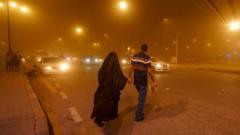A noteworthy sandstorm has engulfed southern Iraq, impacting the health of citizens and highlighting the nation's vulnerability to climate change. Reports indicate that more than a thousand individuals have suffered respiratory problems, with significant cases of suffocation recorded in Muthanna province and others. Local media depicted unsettling images of the region enveloped in an orange haze, leading to flight suspensions across multiple airports and prompting extensive hospitalizations. The Iraqi Environment Ministry has warned of an increase in "dust days" due to changing climate patterns, signifying a concerning trend for the region's future.
Iraq Faces Health Crisis Amid Severe Sandstorm Outbreak

Iraq Faces Health Crisis Amid Severe Sandstorm Outbreak
A recent sandstorm in Iraq has left over a thousand citizens grappling with respiratory issues as authorities scramble to respond.
The ongoing sandstorm has profoundly affected public health in Iraq, particularly in southern provinces.
In the wake of a severe sandstorm that struck Iraq's central and southern regions, health officials report alarming numbers of respiratory issues among the population. The dust-filled air has led to at least 700 incidents of suffocation reported in Muthanna province alone, alongside hundreds more in Najaf, Diwaniyah, Dhi Qar, and Basra provinces. Authorities were forced to close airports in Najaf and Basra due to visibility being reduced to less than one kilometre (approximately 0.62 miles). Local hospitals are overwhelmed, treating various patients with breathing difficulties, including many children. As the nation battles more frequent dust storms—a consequence of climate change, as experts suggest—the Iraqi Environment Ministry warns citizens to brace for an increasing number of "dust days" ahead.
In the wake of a severe sandstorm that struck Iraq's central and southern regions, health officials report alarming numbers of respiratory issues among the population. The dust-filled air has led to at least 700 incidents of suffocation reported in Muthanna province alone, alongside hundreds more in Najaf, Diwaniyah, Dhi Qar, and Basra provinces. Authorities were forced to close airports in Najaf and Basra due to visibility being reduced to less than one kilometre (approximately 0.62 miles). Local hospitals are overwhelmed, treating various patients with breathing difficulties, including many children. As the nation battles more frequent dust storms—a consequence of climate change, as experts suggest—the Iraqi Environment Ministry warns citizens to brace for an increasing number of "dust days" ahead.





















